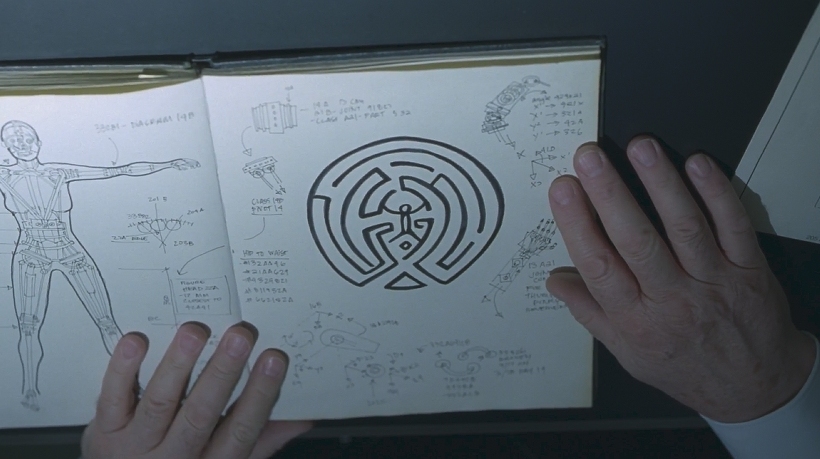The 7nth episode of Westworld resurfaced into goodness after two mediocre ones. The plot moved. Superficial complexity reigned in, although there’s still an annoying amount of petty agendas driving the plot, instead of what I care about, scientific potential and mythical depth.
This was Bernard episode. The initial sequence with Bernard dreaming about his son is interesting not because of what’s obvious, but because the recurring question “have you ever questioned the nature of your own reality”, asked by Bernard himself, is superimposed on the same sequence, BEFORE the transition to the new scene. I guess for most that little hint was lost, but the moment I noticed it I knew that the question was referred to Bernard himself. And in fact the episode ends answering that question. That was some perfect opening and perfect closure.
During the week I started to be persuaded of the fan theory of Bernard as a host. I never pick up fan theories until there are elements in the show that offer concrete references, and in this case more evidence was piling up. The problem is that the evidence I got is all stuff that is still not confirmed in the episode: Bernard is supposed to be Arnold, that’s what motivated the concept of Bernard as a host. Also, when this idea of Bernard as a host was tossed around, most doubts revolved around the scene of Bernard going to talk with his wife. So it’s good that this episode clarified that part. It’s all done deliberately to make it more convincing.
Is Bernard Arnold? The reason I was picking up the idea of Bernard being a host, and modeled after Arnold, was because it compresses some more complexity. There’s this dangling thread we’ve lost behind: not only Ford was interfacing with Dolores, but also Bernard was doing that, telling her about the potential of consciousness and the maze. Now with Delos out of the picture (their meddling was just an attempt to steal the code, there doesn’t seem to be more than these petty reasons), we still have three subjects tampering with Dolores and other hosts. There’s Ford’s main code, there’s Arnold in the form of “ghost in the machine”, and then there’s that scene with Bernard and Dolores.
If later will be revealed that the hidden voice Dolores hears, and that she keeps secret from Ford, is Bernard’s own, then we obtain that Arnold is acting as Bernard. So in this case we have a different split. There’s the Arnold that died, that lurks in the hosts’ code, and there’s an Arnold that survives in the artificial form of an host that Ford built in the shape of his colleague. Another good reason to confirm this is that we’ve been explicitly told not even a picture is left of him. So there needs to be a good reason to “hide” what Arnold looks like, and the only good reason is that it would reveal something: that Bernard looks like Arnold.
Problem: if Bernard is an host under Ford’s control then Ford already knows that Arnold is messing with the code. That’s what Elsie revealed to Bernard in the last episode.
So, this episode puts everything back firmly into Ford’s hands, and I’m relieved.
Problem number 2: this episode both confirmed and denied a popular fan theory. The idea that a segment of the show is happening in the past. The Man in Black is present day, whereas William and Dolores are in the past, and William will become the MiB.
The confirmation comes from a quite explicit hint. William this episode says
“This place, this is like I woke up inside one of those stories.
I guess I just wanna find out what it means.
And this is echoes exactly what the MiB has said a couple of episodes back. It’s a direct reference, and this show doesn’t drop hints casually.
But it also seems to me certain aspects are not coherent. Maeve is awakened in the present, and we know she’s been awakened by Dolores (and Dolores by her father). In the scenes with William we do see an awakened Dolores. Once again it seems way too contrived to have this duality where Dolores is awakened both in the present AND the past. It’s too clunky. And yet that hint between MiB and William is too big to be ignored.
The only possibility is that past and present are similar because they are mirroring each other. Dolores awakening in the past, triggered by Arnold, is what ultimately caused the crisis leading to Arnold’s death (and we know the MiB is the one who “stopped” the crisis, maybe William killing Arnold once he knew it was Arnold manipulating Dolores as a love interest). But Dolores has been awakened even in the present time, as if the cycle is now repeating, maybe this time triggered by Ford. But it’s still too messy for me. In episode 5 we’ve seen Dolores fainting in what’s supposed to be the past, to be recalled in the present and have a conversation with Ford. This is either heavy handed misdirection, or a good proof we don’t have these two timelines.
Finally I wanted to point out the most important aspect for me, and that’s some thematic depth. An idea of conflict between Free Will and consciousness. We usually think they are directly causally connected, consciousness means having free will. But this episode suggests a new way to look at the two, and to keep them separated.
“Being free” means exiting the code. Behave in a way that can’t be predicted, and so that violates some rules that define a behavior. Free Will cannot be coded, it inherently implies the possibility of acting otherwise, of stepping outside a code. But instead there’s nothing inherent to “consciousness” that negates the possibility of codification. We know that consciousness is an hard to crack problem, and philosophers say maybe it’s impossible to solve. But that’s the horizon. We don’t know what to make of consciousness. The problem is exactly whether it is merely complex code, or something transcendental. Something about gods and the world outside the world.
During the “demo” of this episode, the scene where the host is shown to violate the rules, all being set up by Delos to put the blame on Bernard, it is explained what “consciousness” is. There’s irony, because what they say in order to frame Ford/Bernard is exactly what Ford is doing. The reveries allow the hosts to tap into previous cycles, and integrating that former information into their present selves allows them to… guess what? Introduce “new information”. Loops that were supposed to be closed, are instead now left open. That means all this still happens within deterministic code, because previous memories being new information alter the loop behavior, but they don’t directly alter the underlying code.
The reveries allow the hosts to reach a form of consciousness, of awareness. They let them *question their own reality*, same as Maeve is doing. Maeve isn’t behaving outside her code. She’s simply behaving in the way a host would behave when exposed to information that wasn’t previously available, or supposed to be available. She understands she’s part of a loop, she suddenly receives information about the reality of her own reality, so information to correct a blindness, anosognosia. But she’s still a slave of her own code. It’s not new code. It’s the same old code that is being fed new data. The new behavior of Maeve is not unpredictable. It’s new behavior because the information was new.
(leading to my suspicion: that the Arnold code Elsie discovered is Ford’s. So Ford has nothing to learn from that revelation. He’s the one who’s introducing Arnold’s code back into the hosts, in the form of those “reveries”)
This self reflection and self awareness is “consciousness”. And now Maeve can alter her own mind, recursively, giving herself new capabilities. But, again, it’s still the same underlying code reacting to new data. It’s still deterministically sent on its course. But this means the hosts (and human beings in general) aren’t really “conscious”. They only have the appearance of it. It’s still code.
The big point here is that it’s all relative to the level of the analysis. The hosts, at the bottom level, are already as free and conscious as possible, being life-like. To an external observer, like Bernard, that freedom is limited, because he sees the code and can predict the hosts’ behavior. They are just robots. “Awakened” hosts are one level further, they are aware of the loops, Maeve becomes aware she’s an automaton in a park, going through cycles, she even gets the possibility to self-correct by reprogramming herself, but again she’s still slave of the code that initiated this. She’s still not free from the point of view of someone higher in the chain like Ford.
The big point is that freedom is inversely proportional to the information available. The more information you have, the more you realize the artificiality of the process. The Maeve before awakening was entirely “free”, exactly because she wasn’t questioning her reality. The experience she had was directly believable. The choices she made, to herself, were perfectly free for the level of awareness and information available to her. No different from the level of awareness and information we ALL possess by living this life. But the more she receives actual information of the Big Picture, the more she should realize that freedom is lost. She sees her own code, her own dialogue trees. No matter how she recursively feeds that information to her own code, that code is inescapable. Self referential loops don’t break the pattern, it’s merely mise en abyme. Information increases in a way that is inversely proportional to freedom.
Which means, Consciousness and Free Will are the qualities of being limited. Of living under a dome.
Even if this is used in the show for a slightly different and plain meaning (he means the hosts are merely free from human pains), Ford’s lines are revelatory in all their power:
I have come to think of so much of consciousness as a burden
The hosts are the ones who are free.
Free here under my control.
That’s exactly how it is in “reality”.
We have Free Will because we are limited. Because we don’t have the information. The more information we get, the less free we become.



